-
 Bitcoin
Bitcoin $83,733.1364
-1.77% -
 Ethereum
Ethereum $1,593.9356
-2.77% -
 Tether USDt
Tether USDt $0.9998
0.02% -
 XRP
XRP $2.0853
-2.91% -
 BNB
BNB $583.6479
-0.45% -
 Solana
Solana $126.5039
-2.92% -
 USDC
USDC $1.0001
0.04% -
 TRON
TRON $0.2528
-0.29% -
 Dogecoin
Dogecoin $0.1552
-3.13% -
 Cardano
Cardano $0.6138
-4.21% -
 UNUS SED LEO
UNUS SED LEO $9.3705
-0.68% -
 Chainlink
Chainlink $12.3704
-2.64% -
 Avalanche
Avalanche $18.9686
-5.47% -
 Toncoin
Toncoin $2.9086
-0.69% -
 Stellar
Stellar $0.2364
-2.55% -
 Shiba Inu
Shiba Inu $0.0...01174
-1.99% -
 Sui
Sui $2.0985
-4.48% -
 Hedera
Hedera $0.1579
-5.51% -
 Bitcoin Cash
Bitcoin Cash $320.2158
-1.80% -
 Litecoin
Litecoin $76.0872
-2.86% -
 Polkadot
Polkadot $3.5620
-3.37% -
 Dai
Dai $1.0000
0.01% -
 Bitget Token
Bitget Token $4.2568
-1.28% -
 Hyperliquid
Hyperliquid $15.2876
-6.12% -
 Ethena USDe
Ethena USDe $0.9992
0.00% -
 Pi
Pi $0.6229
-15.89% -
 Monero
Monero $216.5721
2.18% -
 Uniswap
Uniswap $5.2334
-2.91% -
 OKB
OKB $52.1638
-0.39% -
 Pepe
Pepe $0.0...07118
-3.52%
How to avoid high fees when buying Bitcoin?
Bitcoin transaction fees vary with network congestion; use fee estimation tools and consider Layer-2 solutions like the Lightning Network to minimize costs.
Mar 29, 2025 at 02:42 am
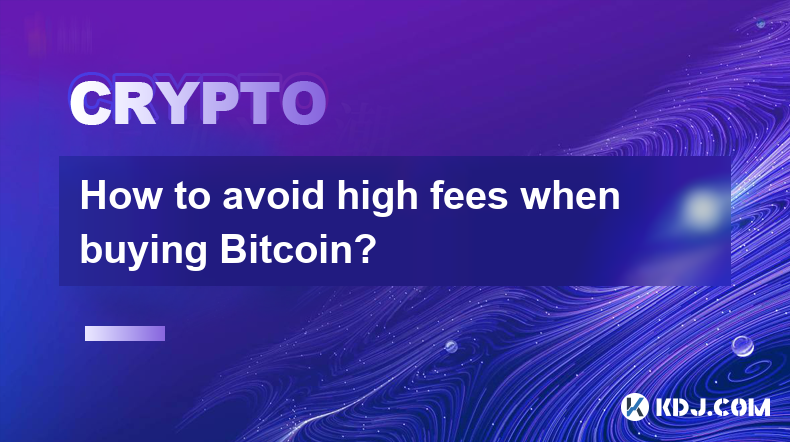
Understanding Bitcoin Transaction Fees
Bitcoin transaction fees are paid to miners to incentivize them to process and validate your transaction on the blockchain. These fees are dynamic, fluctuating based on network congestion. High network activity, such as periods of high trading volume or significant price volatility, typically leads to higher fees. Understanding this dynamic is crucial to minimizing your costs. The fee you pay is directly proportional to the priority you assign to your transaction. Higher fees mean faster confirmation times.
Choosing the Right Exchange or Platform
The platform you use to buy Bitcoin significantly impacts the fees you pay. Different exchanges and platforms have varying fee structures. Some may charge a percentage of the transaction value, while others may have flat fees or tiered fee systems. Researching and comparing fees across multiple platforms before committing to a purchase is essential. Look for exchanges known for competitive and transparent fee structures.
Timing Your Purchases Strategically
Network congestion directly impacts transaction fees. Avoid buying Bitcoin during periods of high market volatility or significant news events, as these times often see increased network traffic and subsequently higher fees. Consider monitoring Bitcoin's network activity using tools that display the current transaction fee levels before initiating a purchase. This proactive approach can save you considerable money.
Optimizing Transaction Size and Batching
Larger transactions generally incur higher fees. Breaking down large purchases into smaller, more manageable transactions can help reduce the overall fees. Similarly, batching multiple transactions together into a single transaction can also prove more cost-effective. This approach requires careful planning and coordination but can yield significant savings on fees.
Utilizing Layer-2 Solutions
Layer-2 scaling solutions, such as the Lightning Network, offer a way to significantly reduce transaction fees. These solutions process transactions off-chain, only settling the final transaction on the main Bitcoin blockchain. While requiring a slightly more technical understanding, using Layer-2 solutions can drastically reduce your fees. However, they may not be suitable for all users.
Using Self-Custody Wallets Wisely
Self-custody wallets, like hardware or software wallets, offer greater control over your Bitcoin and, potentially, lower fees. However, they also require a greater level of technical expertise and responsibility. Carefully consider your technical skills and risk tolerance before choosing this option. Improper handling of self-custody wallets can lead to the loss of your Bitcoin.
Understanding Fee Estimation Tools
Most exchanges and wallets provide fee estimation tools. These tools predict the transaction fee required for your transaction to be confirmed within a specific timeframe. Utilize these tools to get a clear understanding of the potential fees before confirming your purchase. Remember that these are estimations, and the actual fee may vary slightly.
Selecting the Right Transaction Speed
Exchanges often offer different transaction speeds, with faster speeds usually commanding higher fees. Consider whether you need immediate confirmation or if a slightly slower confirmation time is acceptable. Choosing a slower confirmation time can significantly reduce your fees, particularly during periods of high network activity. The balance between speed and cost is crucial.
Avoiding Unnecessary Transactions
Every Bitcoin transaction incurs a fee. Avoid making unnecessary transactions or sending small amounts of Bitcoin frequently. Consolidate your Bitcoin holdings whenever possible to minimize the number of transactions you need to make. This simple practice can save you money over time.
Monitoring Network Fees Regularly
Bitcoin network fees are constantly changing. Regularly monitor the current fee levels using online resources or tools provided by your exchange or wallet. This allows you to make informed decisions about when to buy and sell Bitcoin to minimize your transaction costs. Proactive monitoring is key.
Frequently Asked Questions
Q: What are the typical Bitcoin transaction fees?
A: Bitcoin transaction fees are dynamic and vary greatly depending on network congestion. They can range from a few cents to tens of dollars, sometimes even more during periods of high network activity.
Q: How can I find the current Bitcoin transaction fees?
A: Many websites and tools display real-time Bitcoin network fee information. Your chosen exchange or wallet will often provide fee estimations before you confirm a transaction.
Q: Are there any ways to avoid fees completely?
A: No, there is no way to avoid fees completely when transacting with Bitcoin. Fees are essential for incentivizing miners to process transactions and secure the network.
Q: What is the Lightning Network, and how does it help reduce fees?
A: The Lightning Network is a Layer-2 scaling solution for Bitcoin. It processes transactions off-chain, reducing the load on the main Bitcoin blockchain and thus lowering fees significantly.
Q: Is it safer to buy Bitcoin through an exchange or a self-custody wallet?
A: Both methods have their own security considerations. Exchanges offer convenience but expose your Bitcoin to the exchange's security practices. Self-custody wallets offer greater control but require more technical expertise and responsibility. The best choice depends on your individual risk tolerance and technical skills.
Q: What happens if I set a low transaction fee?
A: If you set a low transaction fee, your transaction may take a very long time to confirm, or it may not be confirmed at all. Miners prioritize transactions with higher fees.
Q: How often should I check Bitcoin network fees?
A: It's advisable to check Bitcoin network fees before each transaction, especially if you're making a large purchase. However, at minimum, checking daily, or even hourly during periods of high volatility, is beneficial.
Disclaimer:info@kdj.com
The information provided is not trading advice. kdj.com does not assume any responsibility for any investments made based on the information provided in this article. Cryptocurrencies are highly volatile and it is highly recommended that you invest with caution after thorough research!
If you believe that the content used on this website infringes your copyright, please contact us immediately (info@kdj.com) and we will delete it promptly.
- Semler Scientific (SMLR) Agrees to Pay $29.75M to Settle DOJ Probe into QuantaFlo Marketing
- 2025-04-16 11:15:19
- 2025 California commercial salmon fishing season closed for a third year running due to dwindling fish numbers
- 2025-04-16 11:15:19
- Dogecoin (DOGE) Eyes $0.21 as Bulls Hold the Line
- 2025-04-16 11:10:13
- Despite Its Recent Rally, XRP Faces an Upward Barrier. A New Contender Is Making Waves
- 2025-04-16 11:10:13
- Bitcoin (BTC) Demonstrates Strength and Resilience as the Dollar Index (DXY) Continues Its Losing Streak
- 2025-04-16 11:05:13
- Within the fast-growing AI ecosystem, social activity is now a key indicator
- 2025-04-16 11:05:13
Related knowledge

What is Bitcoin halving? Analysis of the impact on prices
Apr 09,2025 at 01:14pm
Bitcoin halving is a pivotal event in the cryptocurrency world that occurs approximately every four years, or every 210,000 blocks. The event is designed to reduce the rate at which new bitcoins are generated, thereby controlling inflation and increasing scarcity over time. During a halving, the reward that miners receive for successfully adding a block...
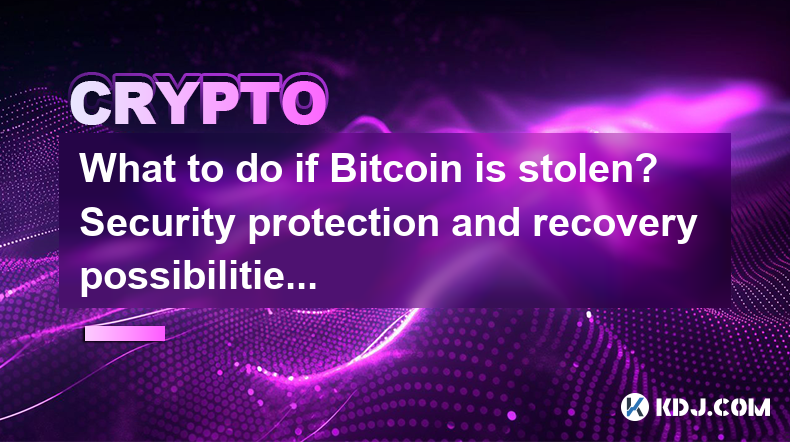
What to do if Bitcoin is stolen? Security protection and recovery possibilities
Apr 09,2025 at 03:42pm
If your Bitcoin is stolen, it can be a distressing experience, but there are steps you can take to protect your remaining assets and attempt to recover your lost funds. This article will guide you through the process of securing your Bitcoin and exploring recovery possibilities. Immediate Actions After Bitcoin TheftThe moment you realize your Bitcoin ha...

How to avoid Bitcoin investment scams? Common scams revealed
Apr 10,2025 at 05:14pm
Introduction to Bitcoin Investment ScamsBitcoin and other cryptocurrencies have become increasingly popular investment options, attracting both seasoned investors and newcomers alike. However, with the rise in popularity, there has also been a surge in Bitcoin investment scams. These scams can range from Ponzi schemes to fake exchanges and fraudulent in...
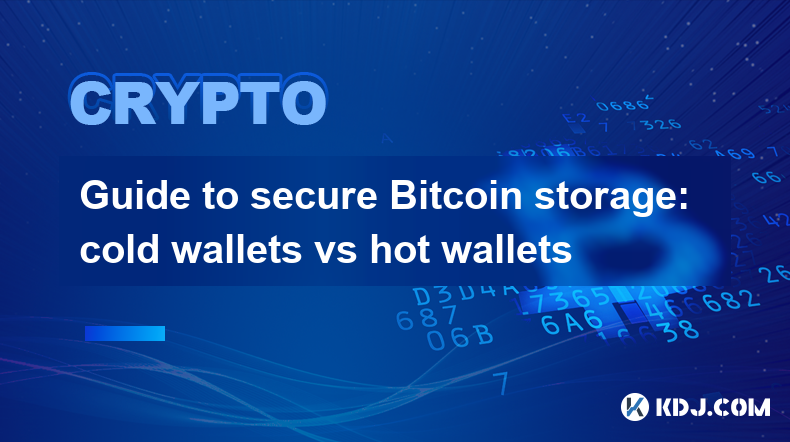
Guide to secure Bitcoin storage: cold wallets vs hot wallets
Apr 11,2025 at 08:42am
Guide to Secure Bitcoin Storage: Cold Wallets vs Hot Wallets When it comes to storing Bitcoin, security is paramount. The choice between cold wallets and hot wallets can significantly impact the safety of your digital assets. This guide delves into the differences between these two types of wallets, their respective advantages and disadvantages, and how...
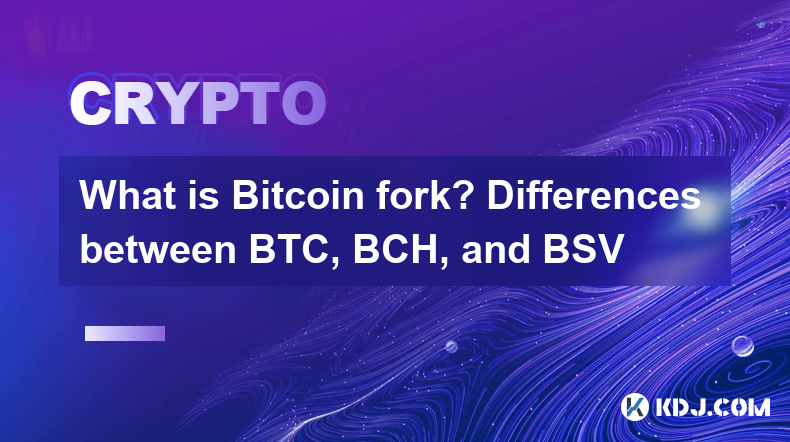
What is Bitcoin fork? Differences between BTC, BCH, and BSV
Apr 10,2025 at 02:21am
A Bitcoin fork refers to a change in the underlying protocol of the Bitcoin blockchain, which results in a divergence into two separate versions of the blockchain. This can happen as a result of a disagreement within the community about the direction of the cryptocurrency, or to introduce new features or improvements. There are two main types of forks: ...
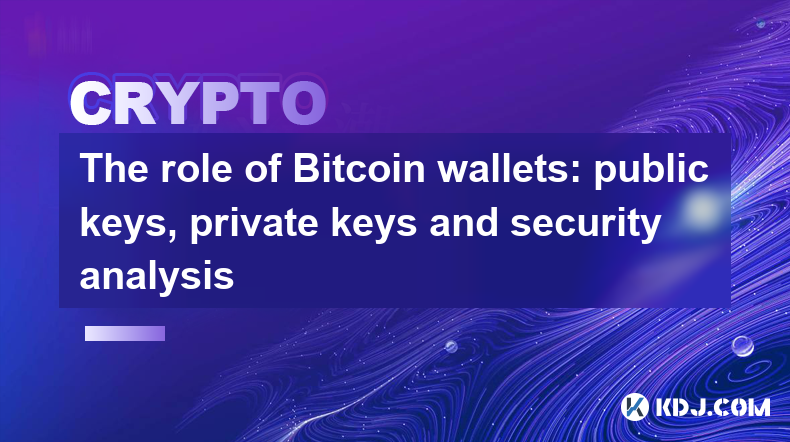
The role of Bitcoin wallets: public keys, private keys and security analysis
Apr 09,2025 at 03:00am
Bitcoin wallets play a crucial role in the world of cryptocurrency, serving as the gateway to securely store, send, and receive Bitcoin. Understanding the intricacies of Bitcoin wallets, particularly the concepts of public keys, private keys, and security analysis, is essential for anyone looking to navigate the cryptocurrency landscape safely and effec...

What is Bitcoin halving? Analysis of the impact on prices
Apr 09,2025 at 01:14pm
Bitcoin halving is a pivotal event in the cryptocurrency world that occurs approximately every four years, or every 210,000 blocks. The event is designed to reduce the rate at which new bitcoins are generated, thereby controlling inflation and increasing scarcity over time. During a halving, the reward that miners receive for successfully adding a block...

What to do if Bitcoin is stolen? Security protection and recovery possibilities
Apr 09,2025 at 03:42pm
If your Bitcoin is stolen, it can be a distressing experience, but there are steps you can take to protect your remaining assets and attempt to recover your lost funds. This article will guide you through the process of securing your Bitcoin and exploring recovery possibilities. Immediate Actions After Bitcoin TheftThe moment you realize your Bitcoin ha...

How to avoid Bitcoin investment scams? Common scams revealed
Apr 10,2025 at 05:14pm
Introduction to Bitcoin Investment ScamsBitcoin and other cryptocurrencies have become increasingly popular investment options, attracting both seasoned investors and newcomers alike. However, with the rise in popularity, there has also been a surge in Bitcoin investment scams. These scams can range from Ponzi schemes to fake exchanges and fraudulent in...

Guide to secure Bitcoin storage: cold wallets vs hot wallets
Apr 11,2025 at 08:42am
Guide to Secure Bitcoin Storage: Cold Wallets vs Hot Wallets When it comes to storing Bitcoin, security is paramount. The choice between cold wallets and hot wallets can significantly impact the safety of your digital assets. This guide delves into the differences between these two types of wallets, their respective advantages and disadvantages, and how...

What is Bitcoin fork? Differences between BTC, BCH, and BSV
Apr 10,2025 at 02:21am
A Bitcoin fork refers to a change in the underlying protocol of the Bitcoin blockchain, which results in a divergence into two separate versions of the blockchain. This can happen as a result of a disagreement within the community about the direction of the cryptocurrency, or to introduce new features or improvements. There are two main types of forks: ...

The role of Bitcoin wallets: public keys, private keys and security analysis
Apr 09,2025 at 03:00am
Bitcoin wallets play a crucial role in the world of cryptocurrency, serving as the gateway to securely store, send, and receive Bitcoin. Understanding the intricacies of Bitcoin wallets, particularly the concepts of public keys, private keys, and security analysis, is essential for anyone looking to navigate the cryptocurrency landscape safely and effec...
See all articles























































































